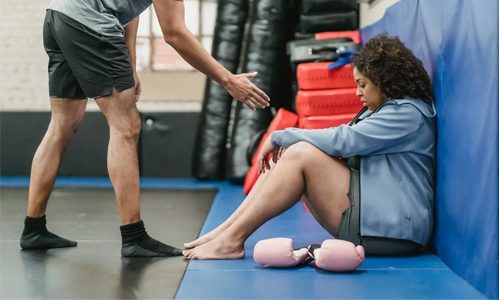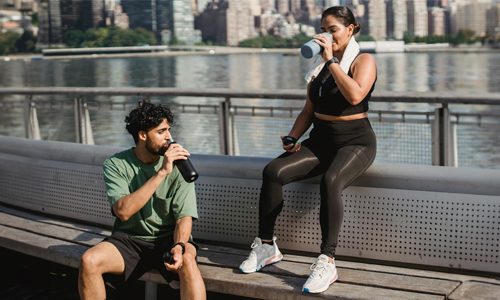Have you ever experienced any side effects after workouts? If yes, it may be due to various reasons such as muscle aches and sweating. Apart from these common effects, another surprising symptom is getting dizzy after a workout. Does this sound familiar? Let’s explore why this happens quite often.
10 Causes for Feeling Dizziness after the Workout
What causes feeling dizzy after workout? From dehydration to low blood pressure, there are a lot of reasons for dizziness after exercise.
1. Dehydration
Dehydration occurs when your body loses more water. Your body temperature increases during exercise, leading to significant sweating to cool down. On hot days, intense workouts can result in a substantial loss of water. This condition can affect individuals of all ages, from children to older adults.
A few symptoms of dehydration are listed below:
- Dry mouth
- Tiredness
- Extreme thirst
- Fatigue
2. Low Blood Sugar
Sugar is the primary energy source for the human body. When you exercise, your muscles consume more glucose than usual. Consequently, some individuals may experience low blood sugar after workouts.
When your blood sugar drops below a certain level (70 mg/dL), it may lead to hypoglycemia. Symptoms of low blood sugar include hunger, clumsiness, fatigue, anxiety, and sweating. Consuming juice, eating fruits, and having snacks can provide relief from these symptoms.
3. Overexertion
Pushing too hard in physical activity can lead to overexertion and a drop in your blood pressure, ultimately resulting in dehydration. This can occur during various activities, including team training sessions, workouts, and other group exercises.
4. Improper Breathing
During exercise, some people may experience a lack of oxygen intake to meet the needs of their muscles. Muscles require more oxygen than usual during exercise. That’s why breathing and heart rates increase to provide sufficient oxygen intake. Individuals who cannot breathe adequately may experience lower levels of oxygen in the brain.
5. Low Blood Pressure
Your blood pressure is typically at its lowest after exercise. However, some people may experience more sudden drops. When you stop exercising, your muscles and heart return to their normal pace. It takes more time for your blood vessels to catch up, which means blood may flow to your brain more slowly.
Do you know the symptoms of low blood pressure? If you have a headache, dizziness, tiredness, or back pain, you are at risk of low blood pressure.
6. Heat Exhaustion
If it’s too hot when you exercise, you may experience heat exhaustion. Your body temperature rises above normal during heat exhaustion, when your body cannot effectively get rid of excess heat during your workout. If heat exhaustion is not promptly treated and recognized, it can lead to heatstroke.
7. Inner Ear Issues
The noise levels in the gym and heavy physical activities can impact your hearing health. If you lift heavy weights during exercise, you may feel a sensation of your ears being clogged. The strain experienced while lifting weights causes pressure within your brain and ears.
8. Medication Side Effects
If you exercise soon after taking medication, you may feel drowsy and become dehydrated. You may also experience nervousness, headache, dizziness, and a faster heartbeat. Therefore, it is advisable to wait an hour or two after taking medication before starting your exercise routine.
9. Hyperventilation
Hyperventilation can cause various disabling symptoms such as dizziness, chest pain, fatigue, and dyspnea. In exercises like Pilates and yoga, your breathing is tightly controlled. During these activities, you might find yourself breathing heavily due to the mental and physical effort you are exerting. However, controlling your breath too much during workouts can result in dizziness and may lead to hyperventilation.
10. Postural Hypotension
Postural hypotension is a sudden drop in blood pressure when you go from sitting to standing or lying to sitting. Dehydration and dizziness are the primary causes of postural hypotension. You can alleviate this condition by exercising gently before getting up or by moving your feet up and down. Additionally, allow sufficient time between exercises for a careful transition from a seated to a standing position.
Is It Normal to Feel Dizzy after Workout?
Most workout sessions can leave you feeling worn out after expending plenty of energy. However, it’s okay to experience dizziness after a workout. The symptoms do not typically indicate anything serious, but in a few cases, they can be alarming. Dizziness after exercising can be caused by dehydration, poor breathing, and fatigue.
You must stretch your body before and after the workout. Here are some common mistakes you make while stretching for a workout.
What to Eat When Feeling Dizzy after Workout?
Do you suddenly feel dizzy after a workout? Check out these foods that you can eat once you experience dizziness.
1. Vegetables:
You can have slices of carrot, cucumber, and other vegetables when you feel dizzy after workout. These vegetables are rich in vitamins, minerals, and proteins that can help with alleviate dizziness. Combine them to make a nutritious salad.
2. Nuts:
If you are feeling lightheaded after the workout, opt for cashews, walnuts, and almonds. These nuts contain beneficial vitamins and fatty acids for your body. Ensure you have a variety of nuts stocked at home.
3. Honey:
Honey is a great sweet option when you are feeling dizzy. It raises your blood sugar quickly and effectively helps combat tiredness.
4. Ice Cream:
In the summer season, eating ice cream when you are a little dizzy can be perfect. The sugar in ice cream can make you feel better and assist with maintaining your blood pressure.
5. Soft Drinks:
Soft drinks are an effective way to introduce some sugar into your bloodstream after a workout. A sip can save you from unbearable dizziness and other symptoms during exercise.
6. Fruits:
When you feel dizzy during workouts, consider eating apples, oranges, grapes, and peaches. All fruits are filled with various vitamins, fiber, and potassium. You can also opt for dried fruits to maintain healthy skin.
Tips to Avoid Dizziness during or after Workout
If you feel lightheaded or dizzy during exercise, you can follow the below methods:
- Drink plenty of water during or after the workout
- Lie down or sit down to avoid falling
- Avoid pushing the body too hard
- Practice regular breathing during exercises
- Increase the workout intensity gradually
- Have vegetables or fruits after your workout
- Rest and breathe after exercise
If you feel dizziness continuously after each workout, it’s time to consult a healthcare provider or doctor. They will prescribe necessary prescriptions or medications for your cure. Make sure you eat well during your workouts and maintain a healthy diet always to overcome diseases.





















